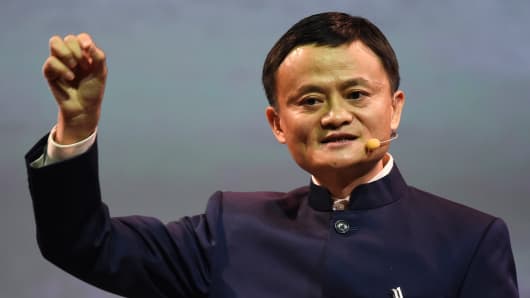
Jack Ma, founder of Alibaba Group Holding Ltd.
"Made in China" was practically the catchphrase of the 1990s.
Shops overflowed with Chinese-made products, from clothing to Christmas toys to lightbulbs and sports equipment, all snapped up by America's middle class. China, for better or worse, was "the workshop of the world," and the U.S. its voracious consumer.
In short order, that tide is reversing.
Jack Ma, the sprightly executive chairman of Alibaba, the Chinese online retail giant, has just made that crystal clear. Ma released a Wall Street Journal op-ed in conjunction with a visit to American businesses this week some nine months after Alibaba went public in a $25 billion offering, the biggest IPO in history.
"We want to connect small business in the West with the largest,fastest-growing market in the East," he wrote. The strategy, according to Ma, is "simple and clear."
"Chinese consumers will get to buy the American products they want," and this, in turn, he said, "will help create American jobs and increase U.S. exports."
Read More: Jack Ma thinks World War III will be a good thing
That's right: Now, it's China's middle class looking to America as a workshop.
And it's a message Americans should be eager to hear. Already, a backlash against the outsourcing of domestic manufacturing over the years has spurred a renewed emphasis on goods "Made in America" and on locally sourced, artisanal products.
There's an added benefit for U.S. companies intrigued by what Ma is saying: The Chinese aren't drawn to American goods because of their low cost, as was the main attraction for U.S. shoppers in the '90s; they simply want American products. And often, they're actually willing to pay a premium to access them.
Take cherries.
Sales from Pacific Northwest farmers to Chinese shoppers took off as soon as the fruit was offered on Alibaba's platform in December 2012, more than tripling to 600 tons last year, noted Ma, versus 180 tons in 2013.
Read More: Alibaba earnings beat estimates
Consider the knock-on effects: The International Airport of Seattle-Tacoma added weekly Asian cargo flights, dubbed "cherry charters," to handle demand. Farmers and regional cherry packers have clearly benefited. And even container lines, whose West Coast import business has shrunk over the years, are now getting a lift from refitting their ships to refrigerate fruit and haul the goods the other way, to China.
"This success can be replicated for other everyday purchases," said Ma, mentioning "seafood from Alaska, pork from Iowa, children's toys from Rhode Island and sports gear from Oregon and Maryland."
Sure, those are thinly veiled references to major U.S. brands such as Hasbro Inc., Nike Inc., and Under Armour, Inc. But U.S. small businesses and start-ups shouldn't overlook the opportunity.
In fact, Victor Anthony of Axiom Capital Management told "Closing Bell" that he thinks Alibaba should acquire eBay Inc. after it spins off PayPal—in part to gain access to the 25 million small businesses that use this platform. "Chinese people, when you talk to them, crave U.S. products," he said, but still face a challenge in locating authentic U.S. goods.
And the opportunity for American industry today to sell to China may even be larger than the opportunity China has had to sell to Americans.
China's middle class, according to Ma, is already equal in size to the entire U.S. population and is expected to double within seven years. Just since 2010, cross-border purchases by Chinese online shoppers have soared to $20 billion, as of last year, versus $2 billion.
It could be the largest opportunity for enterprising Americans since the gold rush, or more recently, the shale oil boom.
As Ma bluntly put it in a speech in New York during his visit: "We need more American products in China."
(Source by: www.cnbc.com)

No comments:
Post a Comment